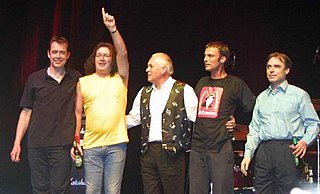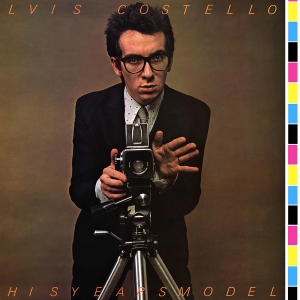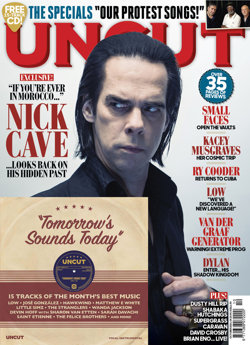Related Research Articles

New Musical Express (NME) is a British music, film, gaming, and culture website and brand. Founded as a newspaper in 1952, with the publication being referred to as a 'rock inkie', the NME would become a magazine that ended up as a free publication, before becoming an online brand which includes its website and radio stations.

Autobahn is the fourth studio album by German electronic music band Kraftwerk, released in November 1974 by Philips Records. The album marked several personnel changes in the band, which was initially a duo consisting of Florian Schneider and Ralf Hütter; later, the group added Klaus Röder on guitar and flute, and Wolfgang Flür on percussion. The album also completed the group's transition from the experimental krautrock style of their earlier work to an electronic pop sound consisting mostly of synthesizers and drum machines. Recording started at the group's own Kling Klang facility, but was predominantly made at Conny Plank's studio. Autobahn also includes lyrics and a new look for the group that was suggested by Emil Schult, an associate of Schneider and Hütter.

Procol Harum were an English rock band formed in Southend-on-Sea, Essex, in 1967. Their best-known recording is the 1967 hit single "A Whiter Shade of Pale", one of the few singles to have sold more than 10 million copies. Although noted for their baroque and classical influence, Procol Harum's music is described as psychedelic rock and proto-prog with hints of the blues, R&B, and soul.
Ian Penman is a British writer, music journalist and critic. He began his career as a writer for the NME in 1977, later contributing to various publications including Uncut, Sight & Sound, The Wire, The Face, and The Guardian. He is the author of Vital Signs: Music, Movies, and Other Manias.

This Year's Model is the second studio album by the English singer-songwriter Elvis Costello, released on 17 March 1978 through Radar Records. After being backed by Clover for his debut album My Aim Is True (1977), Costello formed the Attractions—keyboardist Steve Nieve, bassist Bruce Thomas and drummer Pete Thomas —as his permanent backing band. Recording sessions took place at London's Eden Studios in eleven days between late 1977 and early 1978. Nick Lowe returned as producer, and Roger Béchirian acted as engineer. Most of the songs were written prior to the sessions, and debuted live during the latter half of 1977.

Melody Maker was a British weekly music magazine, one of the world's earliest music weeklies; according to its publisher, IPC Media, the earliest. It was founded in 1926, largely as a magazine for dance band musicians, by Leicester-born composer, publisher Lawrence Wright; the first editor was Edgar Jackson. In January 2001, it was merged into "long-standing rival" New Musical Express.

The Swinging Sixties was a youth-driven cultural revolution that took place in the United Kingdom during the mid-to-late 1960s, emphasising modernity and fun-loving hedonism, with Swinging London denoted as its centre. It saw a flourishing in art, music and fashion, and was symbolised by the city's "pop and fashion exports", such as the Beatles, as the multimedia leaders of the British Invasion of musical acts; the mod and psychedelic subcultures; Mary Quant's miniskirt designs; popular fashion models such as Twiggy and Jean Shrimpton; the iconic status of popular shopping areas such as London's King's Road, Kensington and Carnaby Street; the political activism of the anti-nuclear movement; and the sexual liberation movement.

Sounds was a UK weekly pop/rock music newspaper, published from 10 October 1970 to 6 April 1991. It was known for giving away posters in the centre of the paper and later for covering heavy metal and punk and Oi! music in its late 1970s–early 1980s heyday.

Uncut is a monthly magazine based in London. It is available across the English-speaking world, and focuses on music, but also includes film and books sections. A DVD magazine under the Uncut brand was published quarterly from 2005 to 2006. The magazine was acquired in 2019 by Singaporean music company BandLab Technologies, and was published by NME Networks from December 2021. to August 2023, when the brand was sold to Kelsey Media.
Record Mirror was a British weekly music newspaper between 1954 and 1991 for pop fans and record collectors. Launched two years after the NME, it never attained the circulation of its rival. The first UK album chart was published in Record Mirror in 1956, and during the 1980s it was the only consumer music paper to carry the official UK singles and UK albums charts used by the BBC for Radio 1 and Top of the Pops, as well as the US Billboard charts.

Rock Bottom is the second solo album by former Soft Machine drummer Robert Wyatt. It was released on 26 July 1974 by Virgin Records. The album was produced by Pink Floyd's drummer Nick Mason, and was recorded following a 1973 accident which left Wyatt a paraplegic. He enlisted musicians including Ivor Cutler, Hugh Hopper, Richard Sinclair, Laurie Allan, Mike Oldfield and Fred Frith in the recording.
Fiona Russell Powell is a British journalist. She is best known for her series of interviews throughout the 1980s in The Face magazine. For a brief period in the mid-1980s, she performed as a member of pop group ABC in videos and onstage to support their cartoon-synth album How to Be a ... Zillionaire! (1985). She was credited originally as "Fiona" in early recordings of material for this album, but eventually performed under the stage name "Eden".

"We Love You" is a song by the English rock band the Rolling Stones that was written by Mick Jagger and Keith Richards. Their first new release of the summer of 1967, it was first released as a single on 18 August in the United Kingdom, with "Dandelion" as the B-side. The song peaked at number eight in Britain and number 50 in the United States, where "Dandelion" was promoted as the A-side and peaked at number 14.
Rock's Backpages is an online archive of music journalism, sourced from contributions to the music and mainstream press from the 1950s to the present day. The articles are full text and searchable, and all are reproduced with the permission of the copyright holders. The database was founded in 2000 by British music journalist Barney Hoskyns. As of November 2018, its database contains over 37,000 articles, including interviews, features and reviews, which covered popular music from blues and soul up to the present date. Rock's Backpages also features over 600 audio interviews with musicians from Jimi Hendrix and Johnny Cash to Kate Bush and Kurt Cobain.
Colin Harper is an Irish non-fiction author and composer.

Simon Reynolds is an English music journalist and author who began his career at Melody Maker in the mid-1980s. He subsequently worked as a freelancer and published a number of books on music and popular culture.

This Heat is the debut studio album by English experimental rock band This Heat. Recorded between 1976 and 1978, it was released in September 1979 by record label Piano.
Chris Charlesworth is a British-based music journalist and author; and, between 1983 and 2016, managing editor of Omnibus Press. He is particularly noted for his work about, and with, The Who, for whom he has worked as an executive producer. Charlesworth also worked as David Bowie's publicist at RCA Records from 1979 to 1981.
Mat Snow is an English music journalist, magazine editor, and author. From 1995 to 1999, he was the editor of Mojo magazine; he subsequently served in the same role on the football magazine FourFourTwo.
Tom Hibbert was an English music journalist and film critic. In the 1980s and 1990s, he was a regular writer for music magazines such as Smash Hits, Q and Mojo, and reviewed films for Empire magazine. He was known for his acerbic writing style and irreverent interviews. While at Q, he created the monthly "Who the Hell …?" interview series. In the mid 1990s, he wrote the "Pendennis" column for the Observer newspaper.
References
- 1 2 3 4 "History of Rock, The: articles, interviews and reviews". Rock's Backpages. Retrieved 17 April 2018.
- ↑ "History of Rock Magazine Back Issues, Story of Pop Magazine". Collect-a-Mag. Retrieved 17 April 2018.
- ↑ Raup, Avo. "The History of Rock". afka.net. Retrieved 17 April 2018.
- ↑ Simonelli, David (2013). Working Class Heroes: Rock Music and British Society in the 1960s and 1970s. Plymouth, UK: Lexington Books. pp. 260, 264. ISBN 978-0-7391-7051-9.
- 1 2 "Uncut Introduces New Monthly Magazine to Portfolio – The History of Rock". Time Inc. UK . Retrieved 17 April 2018.
- ↑ "History of Rock". uncut.co.uk . Retrieved 17 April 2018.